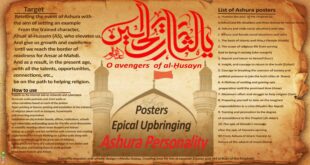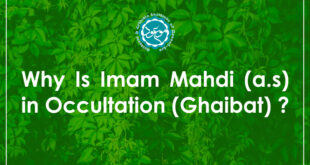In the previous lesson, the background to the appointment of the Prophets was discussed with regard to a few statements of the Nahjul Balaghah. This lesson is aimed at completing what was mentioned before by analyzing in detail the peculiarities of two periods, which are of concern in our discussion, i.e. the pre-Islamic period or the ‘Age of Ignorance’ (the period before the appointment) and the Islamic period (the period after the appointment).
The Age of Ignorance
According to ‘‘Ali’s words, in the Age of Ignorance, the people suffered from two kinds of inadequacies: material and spiritual.
Material Inadequacy
In this period, the level of social welfare and security was very low. This is explicitly expressed both in the Nahjul Balaghah (in different sermons) and the Holy Qur’an. The Qur’an refers to the Age of Ignorance saying (106:4).
Spiritual Inadequacy
Spiritual inadequacy is the very ignorance and bewilderment of the people, i.e., they are devoid of a clear way of living and an aspiration for life. It is, in fact, a great suffering for man and society not to seek a sublime aim in life but only to try to provide for the daily requirements and necessities. Unfortunately, this state of living was characteristic of the ‘time of strangulation’ (Pahlavi reign), when life was without any aspiration and the best and most active individuals, in the eyes of people, were those who made their utmost effort to enjoy a life of welfare or those who did not have any involvement at all but spent their time in lewdness and buffoonery.
Generally speaking, the middle class, i.e., traders, workers, housewives, university students and others were all endeavoring to provide for the ordinary requirements of their lives. The similitude of them was the similitude of the car, which refuels from one gasoline station to another gasoline being a means for it to constantly go from station to station.
In fact, the people worked in order to gain their daily bread, which enabled them, in turn, to work again. They actually spent their lives in eating bread and gaining bread. This state of living cannot be perfectly felt by the idealist youth of today who have specific aims and aspirations in mind, who work for the establishment of the true Islamic government and who seek the fall of the superpowers. It is the existence of these aspirations in the society of today which reveals the spiritual inadequacy (lack of aims and aspirations) of the society during the Pahlavi rule.
Society during the ‘Age of Ignorance’, i.e. before the appointment and revolution of the Prophet, was likewise an aimless and deviated society. The people were bewildered. They turned round themselves just like the ‘mill donkey’ that permanently turns round the millstone, perhaps traversing ten or fifteen kilometers a day, but never moving more than a short distance away from the mill. They were ignorant but more ignorant than them were those who followed destructive aims and aspirations, which, if realized, would destroy them as well as the whole community.
In this regard the Holy Qur’an says:
“Hast thou not seen those who exchanged the bounty of God with unthankfulness, and caused their people to dwell in the abode of ruin?-Gehenna, wherein they are roasted, – an evil establishment!” (14:28-29)
In fact, all the holders of power and authoritative rulers of the world, all the great capitalists who commit any crime to establish their vast economic networks and all those who have brought about great corruption upon the earth in the course of history can be categorized among the spiritually deviated people with destructive aims and aspirations.
To say the least, it was in such a deviated society and among such a misled people that the Prophets were appointed to prophethood. The most outstanding characteristic of such a society is the alienation of man which causes the development of material aspirations in a group of people who follow the aim of making material, monopolies and increasing the rate of material products which, in turn, results in the poverty of other people.
The Commander of the Faithful says, “I never saw an ample blessing (wealth) unless beside it I saw a trampled right.” Poverty gives rise to class distinctions which bring about deeper gaps among the different classes of people and causes other problems such as the unjust division of social authority under which rich classes gain more power than others, although money is not always efficacious in gaining power, but sometimes social power, too, is effective in making use of money and creating material monopolies.
Thus, both social and economic factors are influential in the appearance of tyranny, exploitation, ignorance and deceit in a society where perverse and destructive aims have replaced noble aims and aspirations.
This is where Islamic analysis and material analysis come face to face, for according to materialists, mental possessions, beliefs and whatever comprises one’s soul, mind and thought originate from one’s ‘class position’ which includes the social, economic and even the cultural dimensions of life, whereas the Islamic viewpoint is that the origin of all pressures and adversities existing in a society results from the dominance of ignorance and alienation in that society. Islam says that it is alienation which brings about class distinctions and which divides society into two classes, i.e. the oppressed and the oppressors.
Spiritual alienation is, therefore, an outstanding characteristic of the Age of Ignorance and the Prophets appear, in effect, to lead the people to the straight path and to remove their spiritual depravities. This is what the Commander of the Faithful emphasizes in the second Sermon of the Nahjul Balaghah which was previously mentioned and which is hereunder reviewed and explained in detail.
He says, “I also stand witness that Muhammad, peace and the mercy of God be upon him and his descendants, is His slave and His Prophet, sent him with the illustrious religion, effective emblem, written Book, effulgent light, sparkling gleam and decisive injunction in order to dispel doubts (shubuhat) present clear proofs … „
Shubuha is the plural form of ‘shubha’ and means doubts and differences of opinion, which exist, in the human mind and thought as regards truth and falsehood. These doubts and differences appear, as far as the people’s beliefs are concerned, when the society at large goes astray. In fact, society comes to believe that it lacks reality and to disbelieve the most manifest realities.
For instance, during the rule of the previous regime, the people had come to believe in and accept ‘monarchy’ which was an untrue phenomenon, and had completely forgotten a clear and undeniable reality named, ‘Imamat’.
Thus, the Prophet was sent by God to remove mental doubts and errors and to “present clear proofs,” as the Commander of the Faithful says i.e. to save people from the perplexity of philosophical reasoning by offering them clear proofs. This does not mean, however, that such reasonings are basically useless and philosophy must be abandoned.
 Mouood Mouood English Edition
Mouood Mouood English Edition




